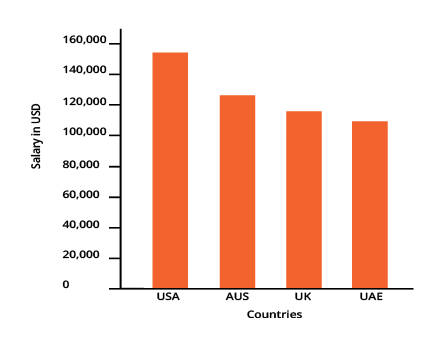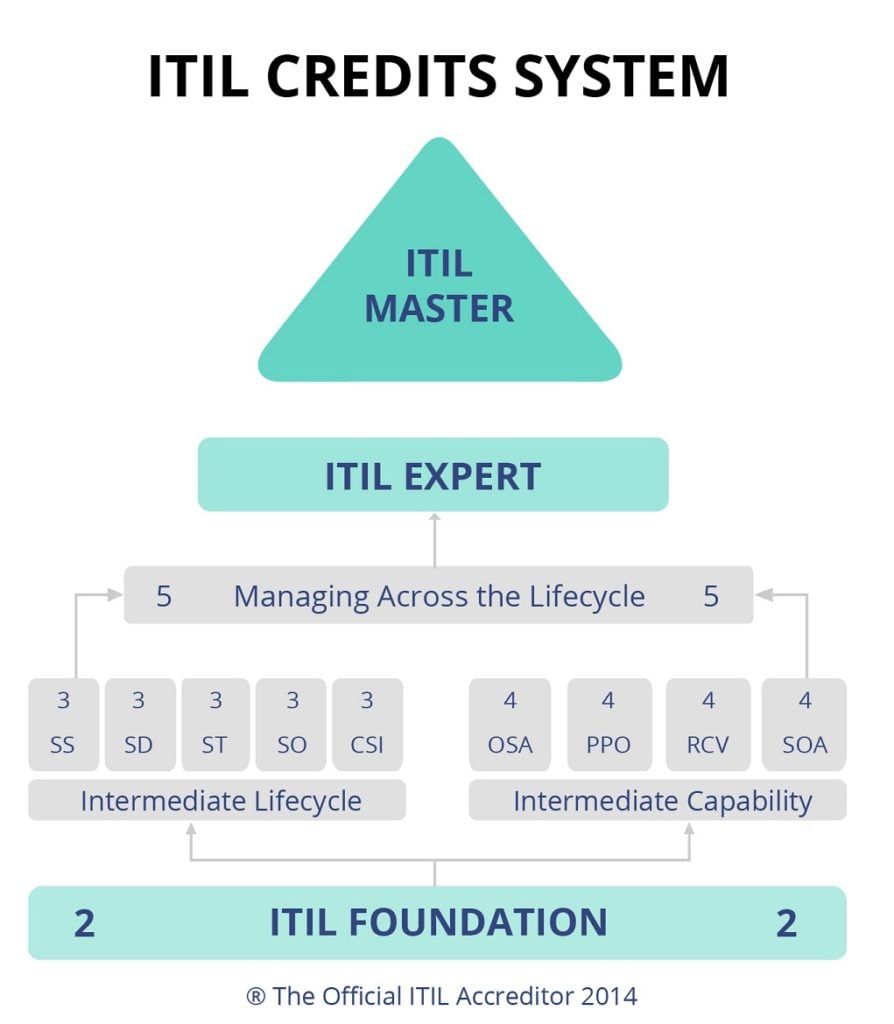
An ITIL (Information Technology Infrastructure Library) certification today is a highly valued qualification on the resume of an ITSM professional. It gives one better opportunities and options to move up the ladder in their own organization or other enterprises. The ITIL credential on your CV sets you apart from your uncertified counterparts, benchmarks your IT service management skills, and widens your reach as a certified professional.
According to the career search portal, PayScale.com, the highest average salary for an ITIL Expert certified professional is ~USD 158,000 in the US, ~USD 125,000 in Australia, ~USD 117,000 in the UK, and ~USD 110,000 in the UAE (as of June 27, 2015). The globally recognized ITIL certifications will give you a launchpad to progress in your career and take it to greater heights.

What is ITIL?
ITIL is a best practice guidance for IT Service Management (ITSM) which is used by organizations in the private and public sectors all across the globe. Today organizations are increasingly becoming dependent on IT in order to satisfy their corporate aims and their business needs. This leads to an increased requirement for reliable, high-quality IT services.
ITIL provides the basis for quality ITSM through documented, proven processes that cover the entire Service Lifecycle. It is easy for organizations to learn, tailor and implement the framework to suit their environment.
Knowledge of ITIL is divided between five levels of qualifications or certifications:
- ITIL Foundation
- ITIL Intermediate – Service Life cycle stream and Service Capability stream
- ITIL Managing Across the Life Cycle
- ITIL Expert Level
- ITIL Master Qualification
The ITIL Credits System
The following credits are assigned to the different levels of ITIL certifications:
| ITIL Certification Level | Credits |
| ITIL Foundation Certificate | 2 credits |
ITIL Intermediate Service Life cycle stream:
|
3 credits each |
ITIL Intermediate Service Capability stream:
|
4 credits each |
| ITIL Managing Across the Lifecycle (MALC) | 5 credits |
The below diagram depicts the different levels of ITIL and its credits:

What is ITIL Foundation Certification?
The starting point for success in ITIL is the ITIL Foundation credential. This is an entry-level qualification for ITSM professionals and offers a general awareness of the service lifecycle and the key elements within. Here the learning objectives and competencies are focused on understanding the overall linkages between the stages in the lifecycle, the processes used, and their contribution to service management practices.
The basic awareness that the ITIL 4 Foundation Course imparts can help you to be better prepared for the transitional challenges that the adoption of ITIL can bring to your organization.
The Topics Covered in the ITIL Foundation Module Include:
- Service Management as a practice (Comprehension)
- Service Life cycle (Comprehension)
- Key Principles and Models (Comprehension)
- Generic Concepts (Awareness)
- Selected Processes (Awareness)
- Selected Roles (Awareness)
- Selected Functions (Awareness)
- Technology and Architecture (Awareness)
- ITIL Qualification Scheme (Awareness)
Who All are Eligible for ITIL Foundation Certification?
It is recommended, though not required, that candidates have exposure to basic concepts in IT-related work experience for at least two years.
Exam Format for ITIL Foundation
- Multiple choice
- 40 questions
- 26 marks required to pass (out of 40 available), equivalent to 65%
- Exam duration: 60 minutes (1 hour)
- Closed book (without the option to refer to any books during the exam)
What are ITIL Intermediate Certifications?
Across the globe, ITSM professionals have been able to improve their job performance and career prospects by earning ITIL certifications. After the entry-level ITIL Foundation, the ITIL Intermediate Level is a dual stream modular series, each with a set of qualifications.
Here you are free to choose different modules from both the Service Lifecycle and Service Capability depending on your career needs. If you are interested in obtaining knowledge of ITIL practices in the Service Lifecycle, then the Service Lifecycle stream will be more beneficial. If your interest lies in a deep level of understanding of processes and roles, then you can go for Service Capability modules.
The main purpose of these modules and the associated exams is to impart, test, and validate the knowledge of industry practices in ITSM and the Service Lifecycle as documented in the ITIL Service Management Practices core publications.
Service Lifecycle Modules
| Module | Course Overview |
| Service Strategy (SS) |
|
| Service Transition (ST) |
|
| Service Design (SD) |
|
| Service Operation (SO) |
|
| Continual Service Improvement (CSI) |
|
Eligibility Criteria for Lifecycle Modules Examinations
- You need to be ITIL Foundation certified
- Successful completion of an accredited course for the module from an ITIL ATO
- Work experience of two years in IT is recommended, but not necessary
Service Capability Modules –
| Module | Course Overview |
| Planning, Protection, and Optimization (PPO) |
|
| Service Offerings and Agreements (SOA) |
|
| Release, Control, and Validation (RCV) |
|
| Operational Support and Analysis (OSA) |
|
Eligibility Criteria for Capability Modules Examinations
- Successful completion of an accredited course for the module from an ITIL ATO
- Work experience of two years in IT is recommended, but not necessary
Exam Format for ITIL Intermediate Service Life cycle and Service Capability Streams
- Multiple choice questions
- 8 scenario-based and gradient-scored questions
- 28 marks are required to pass (out of 40 available), equivalent to 70%
- Examination duration: 90 minutes
- Closed book
What is MALC (Managing Across the Life Cycle)?
The ITIL MALC certification builds on the Lifecycle and Capability Intermediate streams by focusing on the ancillary knowledge required to implement and manage the necessary skills associated with the use of the Lifecycle practices. To move to the next levels in ITIL – ITIL Expert and ITIL Master – one requires balanced credits from their ITIL Foundation, ITIL Intermediate, and ITIL MALC training programs.
The Course and Examination Include:
- Key concepts of the service lifecycle
- Communication and stakeholder management
- Integrating service management processes across the service lifecycle
- Managing services across the service lifecycle
- Governance and organization
- Measurement
- Implementing and improving service management capability.
Eligibility Criteria for MALC
- The candidate must have attained a minimum of 17 credits from a balanced ITIL study. Documentary evidence of this must be presented by candidates for the MALC qualification.
- Successful completion of an accredited course for the module from an ITIL ATO.
Exam Format for ITIL Managing Across the Lifecycle Module
- Multiple choice
- 10 questions
- 35 marks required to pass (out of 50 available), equivalent to 70%
- Exam duration: 120 minutes (2 hours)
- Closed book
Embracing ITIL is the current industry trend. In fact, 52% of respondents in APAC and 68% of respondents in Latin America said that ITIL is becoming more important in the past year due to trends like Cloud and Agile (Source: AXELOS ‘The Importance of ITIL’ Survey). With the increase in demand, the number of ITSM professionals getting ITIL credentials continues to grow day by day. So, commence your ITIL journey today to take your career to the next level.














